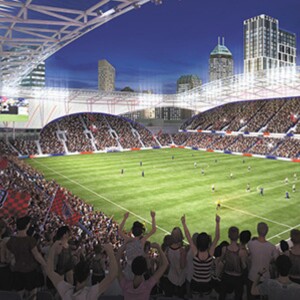
Less than two weeks ago, everything that we had assumed about the future of pro soccer in Indianapolis and the creation of a publicly owned downtown stadium for the Indy Eleven soccer team received a swift kick between the stitches. With head-spinning speed on April 25, the owner of the Indy Eleven accused the city of backing out of negotiations to finalize the stadium deal and support financing for a $1.5 billion mixed use project that the stadium would anchor. Then Mayor Joe Hogsett announced that the city indeed had halted negotiations, claiming in part that the numbers didn’t add up. Indy Eleven representatives disagreed. Hogsett also said the city had been working with an undisclosed group of investors who believed they could bring a Major League Soccer franchise to the city. In fact, Hogsett revealed that he had just met face-to-face with MLS officials in New York and believed the time was right for Indianapolis to take its shot at the top rung of American professional soccer.
That's a relatively simple synopsis, but this set of events has a bewildering number of layers. The Indy Eleven is owned by the same man who owns the development firm Keystone Group, which planned to make the stadium the centerpiece of the $1.5 billion sports, business and residential campus downtown. In fact, it already has broken ground on the site. State legislators gave Indianapolis the means to harness tax revenue to pay for the majority of the stadium, and now the city has proposed using the same tool for a publicly owned soccer stadium that could be built a couple of blocks east of Gainbridge Fieldhouse. City-county councilors, who would have to approve the taxing district, have been skeptical and non-committal. In the meantime, the Indy Eleven continue to play on the IUPUI campus, having built more than a decade of relationships and goodwill in the city soccer community. Can two pro soccer franchises exist in the same city? And does this anonymous ownership group really have the wherewithal to even cover the entry fee for MLS, which most recently was $500 million?
IBJ reporter Mickey Shuey is uniquely qualified to cover this story, since two of his main beats for IBJ are the business of sports and real estate development. For the IBJ Podcast this week, Shuey and host Mason King lay out a clear timeline of events and help unpack and unravel all of these issues, while looking ahead to what might happen next.
The IBJ Podcast is brought to you by Taft.
More Episodes
 2022-02-07
2022-02-07
Create your
podcast in
minutes
- Full-featured podcast site
- Unlimited storage and bandwidth
- Comprehensive podcast stats
- Distribute to Apple Podcasts, Spotify, and more
- Make money with your podcast
It is Free
- Privacy Policy
- Cookie Policy
- Terms of Use
- Consent Preferences
- Copyright © 2015-2024 Podbean.com






